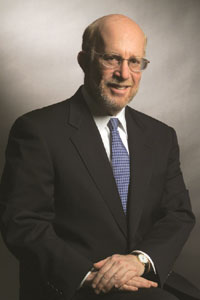5 minutes with... Benjamin Ginsberg
 When did you decide to become a lawyer? Why?
When did you decide to become a lawyer? Why?
I was working as a newspaper reporter in Riverside, CA in the late 1970s covering the County Planning Commission. While no-one knew it at the time, Riverside was becoming the fastest growing county in the country. I saw a massive number of permit filings come to the Commission, and quickly realized I had no clue even what questions to ask to figure out what was really going on. I had always been interested in the law, recognized I needed some more educating and applied to law school.
How did you get into the areas of law you are known for today? By design? Chance? Both?
Pure chance. As a first-year associate, I was happily integrating into a media law practice when the firm needed some research on the history of US House recounts for the Republicans on the House Administration Committee. I jumped at the assignment and produced a document maybe two people read or cared about. But two years later came the Indiana 8 recount, and I serendipitously had a lot of information people needed on the day after the 1984 election. I spent much of the next six months in southwest Indiana, and the next summer I became the in-house counsel at the National Republican Congressional Committee. From there, it evolved.
What do you consider to have been your big break?
Really the good fortune of coming in contact with all the people I’ve come in contact with who have given me opportunities. Certainly that includes being in the right place to participate in Indiana 8 thanks to Jan Baran and Bill Schweitzer, Lee Atwater and Mary Matalin naming me Republican National Committee Counsel, and working on redistricting in the 1991-1992 cycle that helped change the US House for a generation; being hired by Tom Boggs after the 1992 election to help fill his vision that Patton Boggs should be a bipartisan firm; serving as counsel for the 2000 and 2004 Bush-Cheney campaigns and working with James A. Baker III in the Florida recount; and being hired by Mitt Romney for his 2008 and 2012 campaigns. Each was a huge break.
What differences do you see in today's legal market compared to when you started?
It’s a much tighter legal market today, which means a lot of talented people aren’t getting the jobs of their dreams, which is something fortunately my generation did not face. On the other hand, I do think there are even more options in more fields for lawyers as technology changes every profession.
"Presidential campaigns are highly regulated startups."
What achievement are you most proud of?
Every time one of my clients get elected, which is one of the real joys of political law.
What do you consider your greatest failure or regret?
Whenever one of my clients loses.
What law would you change, abolish or create?
I’d change the current campaign finance scheme that has resulted in outside groups having a louder voice in elections than the candidates and their parties.
What are the major legal issues that surround a Presidential campaign?
Presidential campaigns are highly regulated startups. That means the issues are a fascinating and unique combination of campaign finance compliance, a plethora of business, tax, insurance and employment issues, getting a candidate on the ballot in all the different states, how votes are cast and counted, and communications questions regulated by a decade-old law that is not current with the way information travels today. It’s a fascinating mix with new issues certain to appear each election.
What career would you have in your second life?
Professor, shortstop for the Washington Nationals, musician (need a transfusion of new genes for the latter two).
What slogan would you like to be remembered by?
Loving husband and father. No job too big; no job too small.
What advice would you give to students trying to enter the legal profession today? And secondly, to those who hope to ultimately get into the areas of law in which you are expert?
Follow your heart and not your head. Look for opportunities, especially the unexpected ones, that will make you excited to go to work every day. Get some real experience beyond just books.